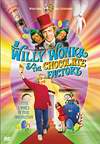Willy Wonka & The Chocolate Factory
Warner Home Video
Cast: Gene Wilder, Jack Albertson, Peter Ostrum, Julie Dawn Cole, Roy Kinnear
Extras: Commentary Track, Retrospective Documentary, Behind the Scenes Featurette, Theatrical Trailer, Still Gallery, Sing Along Songs
Rating:
"Willy Wonka" seems to gain meaning for me, as I get older. Roald Dahl’s classic parable about childishness and chocolate resonates with keen observations about how grown-up petulance starts before puberty and how a good heart "shines in a weary world." Warner Home Video’s sparkling new thirtieth anniversary special edition DVD goes even further, allowing fans to catch up with the five actors who portrayed "the Wonka kids." Through a running <$commentary,commentary track> and J.M Kenny’s superb retrospective documentary "Pure Imagination," listening to Julie Dawn Cole ("Veruca Salt") talk about her kids or Denise Nickerson ("Violet Beauregard") reveal her on-set crush for Peter Ostrum ("Charlie Bucket") is a welcome tonic to the Peter Pan syndrome of never growing up.
Reclusive candy making genius Willy Wonka (Gene Wilder, playing up Wonka’s benign devilishness) sponsors a once-in-several-lifetimes contest by hiding five Golden Tickets amongst the millions of Wonka bars sold all over the world. Each winner receives a tour of the candy factory guided by Mr. Wonka himself as well as an endless supply of scrumdilyumptious chocolates. Poor but honest Charlie Bucket would love to win, if only to help his family. They always have cabbage water for dinner and both sets of grandparents have shared the same bed for the last twenty years.
The film contains so many pleasures; it’s hard to summarize them. The production design by Harper Goff (best known for designing the Nautilus for Disney’s "20,000 Leagues Under the Sea") plugged into every childhood fantasy of limitless candy. (The Chocolate Room still ranks as one of my favorite film images.) Director Mel Stuart’s approach to the material (via Roald Dahl and David Seltzer’s script) has a maturity about it while never losing the child’s perspective. Bollner, Cole, Ostrum, Nickerson, and Themmen work so well in their respective parts that until the documentary I simply assumed they never grew up. Yet the whole affair would be one colorful but empty exercise if it were not for Gene Wilder. His unpredictable delivery strikes the right balance of terror and awe…almost as if speaking in code to our inner, sometimes buried, child.
The <$DD,Dolby Digital> 5.1 audio engages the entire soundfield mostly for the musical numbers. For the rest of the film, seemingly all sound emanated from the center channel. The only time I noticed any sound effects coming from the rear speakers was, again, during the "Wonkatania" sequence. Fidelity is a little thin, given the age of the soundtrack, but dialogue plays cleanly (it distorted only once) and the music swells never overtaxed the tweeters. Audio options include French, Spanish and Portuguese mono soundtracks.
The <$commentary,commentary track> with the "Wonka five" practically unfolds like a soap opera! Denise and Julie had crushes on Peter and shared him on different days! (No joke, they frequently refer to how they would take turns cooing over him.) The conversation runs from production trivia (according to Bollner, the Chocolate River was very cold) to contemporary observations (Peter and Julie have some hair raising stories about their character’s hairstyles) to guilty confessions (Julie spills the beans about "nicking" certain props from the set…and still having them). Everybody laughs, ribs each other and gives glimpses into what it was like working on some of the fantastic sets.
A four-minute promotional featurette from 1971 takes a more traditional approach to documenting the production, focusing mostly on Harper Goff and the sets. The source materials are quite grainy and the sound tinny. Better to conceal the over-earnest narration.
In the "Wonka Sing Along" section, viewers can karaoke their way through four songs: "I’ve Got a Golden Ticket," "Pure Imagination," "I Want It Now," and the Oompa Loompa song (the Veruca Salt version). The disc access the designated chapter, then fancy script at the bottom third of the screen gives the lyrics with highlights at the appropriate moments. The songs may be selected individually or hit the "Play All" option. However, when I tried the Oompa Loompa song several times, no lyrics popped up. (I can’t determine if it’s my player or a technical glitch.) Cute but geared more to kids.
The theatrical trailer is from the original theatrical release. Presented in <$PS,widescreen>, the trailer touches all the right bases in selling the film’s whimsy, music and fantasy. The original DVD release offered the trailer for the 1996 25th anniversary release, which does not appear here.
Warner’s new "Wonka" DVD was a complete joy to watch. (While I personally do not mind watching the full-frame version – especially since it is an <$OpenMatte,open matte> transfer that actually adds picture information at the top and bottom of the screen, an <$16x9,anamorphic> <$PS,widescreen> release with the same supplements will be released in November.) It’s a special edition with a small heart crammed into a big DVD. Strike that, reverse it.







